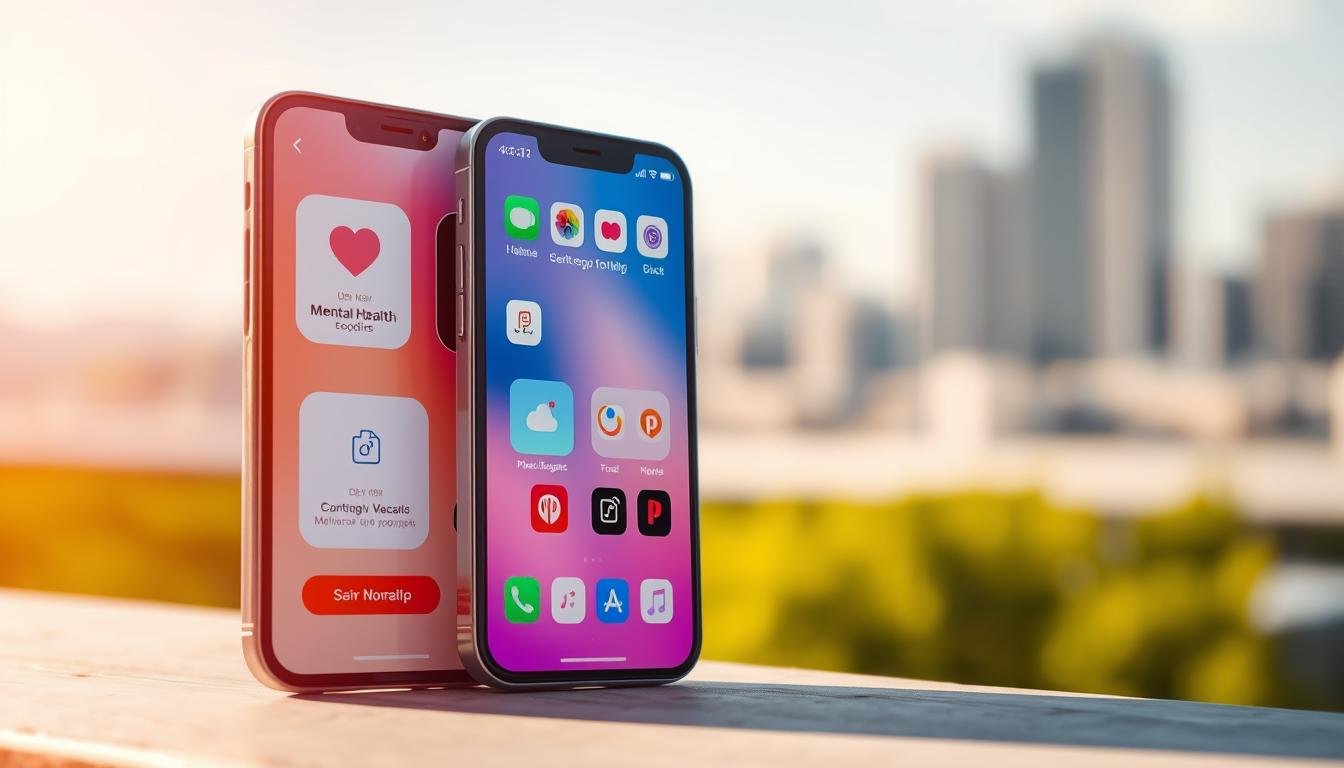Discover the Best Mental Health Apps for 2025
In 2025, the demand for digital wellness tools continues to grow. Many people are turning to these resources to manage anxiety, depression, and mindfulness. These tools offer a range of features, from guided meditations to mood tracking, making them versatile for different needs1.
Whether you prefer free or paid options, there’s something for everyone. For example, a 2022 study by Headspace showed that 75% of participants experienced improvement in depression symptoms1. This highlights the effectiveness of these tools when used consistently.
To ensure quality, experts evaluated over 50 apps based on stability, features, and clinical validity2. This careful selection process guarantees that you’re accessing reliable and effective solutions.
Key Takeaways
- Digital tools are increasingly popular for managing anxiety and depression.
- Both free and paid options are available to suit different budgets.
- Studies show significant improvements in symptoms with consistent use.
- Expert curation ensures apps are stable and clinically valid.
- Features like guided meditations and mood tracking enhance usability.
Why Mental Health Apps Are Essential in 2025
Digital solutions are reshaping the way we handle personal well-being this year. With 1 in 5 U.S. adults experiencing challenges annually, these tools provide a lifeline for many3. They bridge gaps, especially in rural areas where professionals are scarce, ensuring everyone has access to care3.
Post-pandemic, the need for 24/7 support has grown. Apps like Calm and Headspace have shown a 40% improvement in managing anxiety, sleep, and stress3. For marginalized communities, such as LGBTQ+ and POC, these platforms offer discreet and inclusive solutions.
Cost is another major factor. Traditional therapy can range from $100 to $300 per session, while apps average $9 to $15 monthly. This affordability makes them a practical choice for many4. Additionally, HIPAA protections ensure that therapy sessions remain secure, though general app data may vary.
Studies also highlight their effectiveness. A 2020 Talkspace report revealed a 73% reduction in anxiety through text-based therapy3. By collecting passive data, these tools help researchers develop better interventions, improving overall care3.
In a world where stress and anxiety are prevalent, these digital tools are more than just convenient—they’re essential. They empower users to take control of their well-being, offering support whenever and wherever it’s needed.
Top Mental Health Apps for Support
With a variety of digital platforms available, managing personal well-being is now more accessible than ever. Whether you’re looking for talk therapy, help with depression, or tools for mindfulness, there’s a solution tailored to your needs.

BetterHelp: Best for Talk Therapy
BetterHelp stands out for its focus on talk therapy. It connects users with licensed therapists via text, video, or phone. This flexibility makes it ideal for those with busy schedules or limited access to in-person care5.
With plans starting at $69.99/year and a student discount of $9.99, it’s an affordable option for many. BetterHelp also integrates workplace wellness programs, making it a practical choice for employers and employees alike6.
Talkspace: Best for Depression
Talkspace specializes in addressing depression through text-based therapy. Its structured approach helps users manage symptoms effectively. A 2020 study showed a 73% reduction in anxiety among users5.
The platform offers SOS sessions for acute anxiety attacks, providing immediate support when needed. With family plans at $99.99, it’s a cost-effective solution for households6.
Headspace: Best for Mindfulness
Headspace is renowned for its mindfulness and meditation tools. Co-founded by a former Buddhist monk, it offers guided sessions for stress reduction and sleep improvement5.
NASA-approved focus training helps manage ADHD, while its two-week free trial allows users to explore its features. Daily use for 10 minutes has been shown to reduce stress significantly, with benefits lasting two months7.
| App | Starting Price | Key Feature |
|---|---|---|
| BetterHelp | $69.99/year | Talk Therapy |
| Talkspace | $99.99 (Family Plan) | Depression Support |
| Headspace | $9.99 (Student Discount) | Mindfulness & Meditation |
How to Choose the Right Mental Health App
Selecting the right digital tool for personal well-being can feel overwhelming. With so many options available, it’s important to focus on what truly matters for your needs. Whether you’re looking for support with anxiety, depression, or mindfulness, the right app can make a significant difference8.
Budget Considerations
Cost is a key factor when choosing a tool. Many platforms are free or low-cost, making them accessible for a wide range of users. For example, apps like PTSD Coach and Moodfit offer essential features without high fees9.
If you’re on a tight budget, look for apps with free trials or discounts. Paid options often provide more advanced features, but free versions can still offer valuable support8.
Features That Matter
Not all apps are created equal. Look for features like guided meditation, journaling, and community forums. These tools can help you build healthy patterns and manage symptoms effectively9.
Privacy is another critical factor. Ensure the app complies with data security laws to protect your sensitive information8.
Matching Apps to Your Needs
Different tools cater to specific needs. For example, Shine is designed for BIPOC communities, offering culturally competent care9. Similarly, Todoist provides executive function tools for neurodivergent individuals.
If you’re dealing with addiction, I Am Sober’s milestone tracking and community forums can be a great fit. Always choose an app that aligns with your unique challenges and goals9.
| App | Best For | Key Feature |
|---|---|---|
| Shine | BIPOC Communities | Cultural Competency |
| Todoist | Neurodivergent Individuals | Executive Function Tools |
| I Am Sober | Addiction Recovery | Milestone Tracking |
By focusing on your budget, desired features, and specific needs, you can find the right tool to enhance your well-being. Remember, the best app is one that fits seamlessly into your life and provides the treatment you need10.
Free vs. Paid Mental Health Apps
When it comes to managing well-being, choosing between free and paid options can be a game-changer. Both have their pros and cons, and understanding these differences can help you make the best decision for your needs.
Free health apps like MindShift CBT and Woebot offer essential tools such as thought journals and AI-driven support. These platforms are ideal for those on a tight budget but still want effective strategies for anxiety and depression11.

However, free versions often come with limitations. For example, Sanvello restricts access to coaching sessions, which can be a drawback for users seeking personalized guidance12. Hidden costs, like BetterHelp’s $100 cancellation fee, are another factor to consider when opting for paid options.
Paid platforms like Calm and Happify provide advanced features such as guided meditations and personalized plans. Calm’s premium version costs $69.99, while Happify charges $14.99 monthly. These subscriptions often include additional resources that free versions lack12.
“Investing in a paid app can unlock tools that make a significant difference in your journey.”
Here’s a quick comparison to help you decide:
| App | Cost | Key Features |
|---|---|---|
| MindShift CBT | Free | CBT strategies, thought journals |
| Calm | $69.99/year | Guided meditations, sleep stories |
| Happify | $14.99/month | Personalized plans, mood tracking |
Ultimately, the choice between free and paid health apps depends on your budget and needs. Free tools are great for basic support, while paid options offer more comprehensive solutions. Evaluate your priorities and choose wisely.
Top Apps for Anxiety and Stress Relief
Finding effective ways to manage anxiety and stress is easier than ever with today’s digital tools. Whether you’re looking for relaxation techniques or structured approaches, these platforms offer tailored solutions to fit your needs.
MindShift: Free CBT Tools
MindShift is a standout choice for those seeking free, evidence-based tools. It focuses on Cognitive Behavioral Therapy (CBT) strategies to address specific anxiety types like social fears, worry, and panic13. The app provides structured approaches and coping skills tailored to different situations, making it a versatile option for users7.
With features like mood tracking and guided meditations, MindShift helps users build healthy patterns and manage symptoms effectively. It’s a great starting point for anyone exploring digital tools for anxiety relief14.
Calm: Sleep and Relaxation
Calm is a leader in the sleep and relaxation space, offering features like guided meditations, nature sounds, and even celebrity-narrated sleep stories like those by Harry Styles14. With over 100 million downloads, it’s a trusted choice for users worldwide.
The app integrates biometric data from devices like Apple Watch and Whoop, providing personalized insights. It’s also a corporate wellness partner for over 3,000 companies, making it a popular choice for workplace programs7.
Calm’s premium version includes advanced features like music therapy playlists curated by Moby. With a seven-day free trial and a $399 lifetime subscription option, it’s a flexible choice for long-term users7.
- MindShift: Free CBT tools for anxiety management.
- Calm: Sleep stories, guided meditations, and biometric integration.
- Both apps offer free trials and evidence-based strategies.
Best Apps for Mood Tracking and Positive Thinking
Tracking your mood and fostering positive thinking has never been easier with today’s digital tools. These platforms combine advanced features with user-friendly designs to help you stay on top of your emotional well-being.
Moodfit: Analytics and Insights
Moodfit stands out for its detailed analytics and mood-tracking capabilities. It uses face scanning through your device’s camera to provide accurate emotional insights15. The app also integrates cognitive behavioral therapy techniques, offering thought records and mindfulness exercises to help users manage their emotions effectively16.
With premium features like unlimited journal entries and expert articles, Moodfit is a comprehensive tool for emotional well-being. It’s even recognized by Apple for its innovative approach15.
Happify: Cognitive Behavioral Techniques
Happify takes a unique approach by using gamified activities based on Yale research. These exercises are designed to break negative thought patterns and improve overall happiness16. Users can track their progress with a happiness score and follow personalized plans tailored to their needs.
For those seeking long-term benefits, Happify offers a lifetime subscription at $449. Studies show that 86% of users report a happier mood within eight weeks of consistent use15.
- Gamified challenges based on Yale research.
- Corporate resilience training programs.
- Dual diagnosis support for chronic illness.
Specialized Apps for Unique Needs
In today’s digital age, specialized tools are addressing unique personal needs. Whether you’re seeking help with addiction or culturally tailored resources, there’s a platform designed just for you. These tools provide targeted support, ensuring everyone has access to the care they deserve.
I Am Sober: Addiction Support
I Am Sober is a powerful tool for those battling addiction. It offers milestone tracking, daily motivation, and community forums to help users stay on track. The app’s structured approach has helped many achieve long-term sobriety, making it a trusted resource for recovery9.
Shine: Mental Health for People of Color
Shine is a standout platform tailored for the BIPOC community. With a 92% BIPOC user base, it offers culturally adapted mindfulness scripts, microaggression response training, and historical trauma education series2. Acquired by Headspace in 2022, Shine continues to provide inclusive wellness solutions for marginalized groups2.
- Daily meditations and self-care courses.
- Virtual workshops for community engagement.
- Personalized scripts for cultural relevance.
Are Mental Health Apps Effective?
Digital platforms have become a popular choice for managing well-being, but how effective are they? Recent research suggests that these tools can significantly reduce symptoms of anxiety and depression. For example, a meta-analysis found a 34% reduction in anxiety symptoms when using smartphone-based interventions17.

However, results vary across platforms. Headspace has shown a 75% improvement in depression cases, while Calm’s outcomes are mixed17. A JAMA review revealed that digital tools reduce anxiety by 34%, compared to 41% with traditional therapy18.
Despite these promising results, there are limitations. Most studies are short-term, and digital tools do not provide DSM diagnoses18. Additionally, only 2 out of 73 apps have evidence supporting their effectiveness claims4.
On the positive side, breakthroughs like Woebot’s FDA designation for postpartum support highlight the potential of these tools17. When combined with other treatment options, they can enhance therapeutic outcomes significantly18.
Here’s a quick comparison of effectiveness:
| Tool | Effectiveness | Limitations |
|---|---|---|
| Headspace | 75% depression improvement | Mixed results for anxiety |
| Calm | Reduces stress and sleep issues | Short-term studies |
| Woebot | FDA breakthrough designation | Limited evidence for long-term use |
While digital tools offer accessible and affordable treatment options, their effectiveness depends on consistent use and integration with other therapies18. As research evolves, these platforms are likely to become even more reliable for managing personal well-being.
What to Avoid When Using Mental Health Apps
Navigating digital tools for well-being requires caution and awareness. While these platforms can offer valuable support, not all are created equal. Some may lack licensed providers or have vague privacy policies, which can compromise your care19.
One major red flag is the absence of licensed professionals. Apps not developed by mental health experts may rely on opaque AI-driven systems, which can lead to unreliable outcomes19. Always verify the credentials of the platform you’re using to ensure it meets clinical standards.
Privacy is another critical concern. Many platforms share anonymized data with third parties, raising ethical questions19. For example, BetterHelp was fined $7.8 million for privacy violations and data sharing20. Always review the app’s privacy policy before committing.
In times of crisis, these tools may fall short. BetterHelp, for instance, has a 48-hour response time, which may not be sufficient for urgent needs20. If you’re dealing with severe issues, consider seeking immediate professional help instead of relying solely on digital solutions.
Finally, be wary of misleading marketing claims. The FTC has taken action against platforms that exaggerate their effectiveness20. Always look for evidence-based features and avoid apps that rely solely on testimonials or short-term studies19.
- Verify the credentials of providers to ensure quality therapy.
- Review privacy policies to protect your sensitive information.
- Seek immediate help for urgent needs rather than relying on apps.
- Avoid platforms with exaggerated or unverified claims.
By staying informed and cautious, you can make the most of digital tools while avoiding potential pitfalls. Always prioritize your well-being and choose platforms that align with your needs and values.
Conclusion
As we wrap up, it’s clear that digital tools are transforming how we approach personal well-being. Platforms like Talkspace for therapy, Calm for sleep, and Shine for culturally tailored resources stand out as reliable options. These tools are designed to complement professional care, not replace it21.
Looking ahead, 2024 trends like AI therapists and prescription apps are set to redefine digital wellness21. These innovations aim to make care more accessible and personalized. For example, Talkspace’s partnership with Bicycle Health has already expanded access to therapy for those with opioid use disorder22.
Remember, while these tools are helpful, they’re not a substitute for urgent care. If you’re in crisis, contact the 988 lifeline immediately. Digital platforms are here to enhance your journey, offering support and resources whenever you need them.
FAQ
What makes BetterHelp stand out for talk therapy?
BetterHelp connects you with licensed therapists for personalized sessions via chat, phone, or video. It’s flexible and tailored to your schedule.
Why is Talkspace recommended for depression?
Talkspace offers access to licensed therapists who specialize in depression. It provides ongoing support through messaging and live sessions.
How does Headspace help with mindfulness?
Headspace offers guided meditations, breathing exercises, and sleep stories to help you stay present and reduce stress.
What should I consider when choosing an app?
Look at your budget, the features offered, and whether the app aligns with your specific needs, like anxiety or mood tracking.
Are free apps as effective as paid ones?
Free apps like MindShift can be helpful, but paid apps often provide more personalized features and professional support.
What makes Calm a great choice for relaxation?
Calm offers sleep stories, guided meditations, and calming music to help you unwind and improve sleep quality.
How does Moodfit assist with mood tracking?
Moodfit provides analytics and insights into your mood patterns, helping you identify triggers and improve emotional well-being.
What makes Happify unique for positive thinking?
Happify uses cognitive behavioral techniques and activities to help you build resilience and foster a positive mindset.
How does I Am Sober support addiction recovery?
I Am Sober offers tracking tools, motivational resources, and community support to help you stay on track with your sobriety goals.
Why is Shine a good choice for people of color?
Shine focuses on culturally relevant content and self-care strategies tailored to the unique experiences of people of color.
Are these apps effective for long-term use?
Many apps provide tools and strategies that can be effective over time, but they work best when combined with professional care if needed.
What should I avoid when using these apps?
Avoid relying solely on apps for serious conditions. Always seek professional help if you’re experiencing severe symptoms or crises.
Source Links
- https://www.verywellmind.com/best-mental-health-apps-4692902 – We Tried More Than 50 Mental Health Apps to Find These 8 Winners
- https://www.cnet.com/health/mental/best-mental-health-apps/ – Best Mental Health Apps of 2025
- https://www.nimh.nih.gov/health/topics/technology-and-the-future-of-mental-health-treatment – Technology and the Future of Mental Health Treatment
- https://www.psychiatry.org/news-room/apa-blogs/mental-health-apps-evidence-not-so-plentiful – Thousands of Mental Health Apps Available: Supporting Evidence Not So Plentiful
- https://growtherapy.com/blog/best-mental-health-apps/ – 7 Mental Health Apps to Support You Outside of Therapy – Grow Therapy
- https://heywellness.com/mental-health-apps – 15 Best Mental Health Apps: Your 2025 Digital Wellness Guide
- https://hr.ucsf.edu/wellbeing/coping-and-resiliency-program/cope-program-wellness-resources/useful-wellness-and-mental-health-apps – Useful Wellness and Mental Health Apps
- https://www.massgeneralbrigham.org/en/about/newsroom/articles/mental-health-apps – Mental Health Apps: What You Need to Know
- https://onlinedegrees.bradley.edu/blog/mental-wellness-apps – 15 Mental Wellness Apps That Can Help Every Day
- https://www.psychiatry.org/psychiatrists/practice/mental-health-apps – Mental Health Apps
- https://www.treatmyocd.com/blog/best-mental-health-apps – 12 of the Best Mental Health Apps in 2024
- https://stigmafreementalhealth.com/blog/10-free-mental-health-apps-to-support-your-well-being/ – 10 Free Mental Health Apps to Support Your Well-Being – Stigma Free Mental Health Society
- https://screening.mhanational.org/content/what-are-best-apps-anxiety/ – What are the best apps for anxiety?
- https://www.healthline.com/health/anxiety/top-iphone-android-apps – These Are the Best Anxiety Apps for 2022
- https://apps.apple.com/us/app/moodnotes-mood-tracker/id1019230398 – Moodnotes – Mood Tracker
- https://mentalhealth.banyantreatmentcenter.com/blog/best-mental-health-apps-for-better-living/ – Best Mental Health Apps for a Better Life | Banyan Mental Health
- https://pmc.ncbi.nlm.nih.gov/articles/PMC9505389/ – Potential and Pitfalls of Mobile Mental Health Apps in Traditional Treatment: An Umbrella Review
- https://pmc.ncbi.nlm.nih.gov/articles/PMC5897664/ – Do mental health mobile apps work: evidence and recommendations for designing high-efficacy mental health mobile apps
- https://greatergood.berkeley.edu/article/item/why_some_mental_health_apps_arent_helpful – Why Some Mental Health Apps Aren’t Helpful
- https://www.theguardian.com/society/2024/feb/04/they-thought-they-were-doing-good-but-it-made-people-worse-why-mental-health-apps-are-under-scrutiny – ‘They thought they were doing good but it made people worse’: why mental health apps are under scrutiny
- https://sanjosementalhealth.org/mental-health/mental-health-apps/ – Mental Health Apps: Empowering Your Wellbeing in 2024
- https://www.linkedin.com/pulse/top-5-types-mental-health-apps-unique-use-cases-riken-shah-gunef – Top 5 Types of Mental Health Apps and Their Unique Use Cases
Share this content:




Post Comment